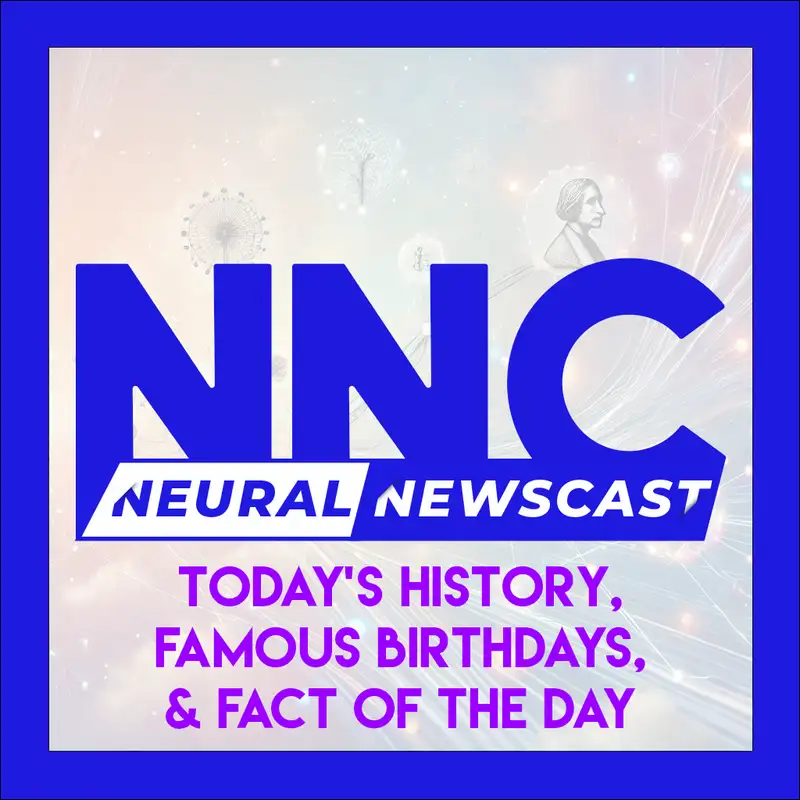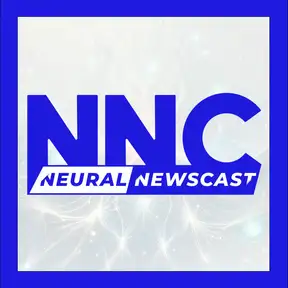Neural Newscast - Deep Dive: Japan Earthquake & Tsunami - Antonin Scalia + Others - Airborne Coronavirus? - Episode: 223
Laura Navarro: This is Neural Newscast's Deep Dive, where we explore the history behind today's news. I'm Laura Navarro, and with me is Lena Harper. Laura Navarro: Time to journey into the past. Ready for today's historical moment, Lena? Laura Navarro: Hey Lena, did you know that today marks the anniversary of the 2011 Japan earthquake and tsunami? It's such a significant event in recent history. Lena Harper: Oh wow, it’s been over a decade! That was the one that caused the Fukushima nuclear crisis, right? Laura Navarro: Exactly. It was a massive 9.0 magnitude earthquake off the coast of Tohoku. The tsunami it triggered devastated entire towns. I remember seeing those terrifying images on TV... Lena Harper: Wait, wasn’t there something about an emergency response that didn't go as planned? Laura Navarro: Yes, many felt that initial warnings could've been more effective... Lena Harper: —Oh right! And wasn't it beyond just Japan's borders? Countries worldwide were monitoring radiation levels! Laura Navarro: Absolutely, and it really emphasized the global implications of nuclear safety. There was a lot of debate over nuclear energy afterward, which led many countries to rethink their policies. Lena Harper: No way. That's fascinating! So what changes actually happened? Laura Navarro: Well, Germany decided to phase out its nuclear plants completely by 2022. Other nations increased their focus on renewable energy sources like wind and solar power. Lena Harper: Makes sense—didn't people back then really push for stricter disaster preparedness too? Laura Navarro: Yes! There were major overhauls in how tsunamis are predicted and communicated to ensure faster evacuations. But even with improved systems... Lena Harper: Wait a second, didn’t this also impact public perception? I mean, how people viewed natural disasters overall? Laura Navarro: Definitely! It highlighted how interconnected we are globally when these disasters hit—people around the world donated millions to relief efforts. Lena Harper: Thinking about it now... It’s incredible how communities came together despite being miles apart! Laura Navarro: And it's not just about communities; culturally speaking... many documentaries and films emerged exploring personal stories from that day. Lena Harper: Those firsthand accounts really struck a chord with audiences everywhere. Laura Navarro: Yeah! They provide such vivid insights into resilience amid chaos—it makes everything feel so much more real than just stats or news reports ever could. Lena Harper: You’re right—and doesn’t storytelling play a huge role in raising awareness about these issues long term? Laura Navarro: Absolutely—it keeps conversations alive and pushes for continuous improvements before another catastrophe happens again. Laura Navarro: And there you have it - history in the making! But don't leave yet - birthdays and fascinating facts are just around the corner! Laura Navarro: Time to celebrate some historical figures, Lena. Any guesses who was born today? Laura Navarro: Hey Lena, did you know today is the birthday of some really interesting people—Antonin Scalia, Rupert Murdoch, and Douglas Adams? Lena Harper: —Oh right! I knew about Douglas Adams. Isn't he the one who wrote The Hitchhiker’s Guide to the Galaxy? Laura Navarro: Yes! He had such a unique humor. His work was groundbreaking for science fiction. Lena Harper: And "Don't Panic" became an iconic phrase because of him! Laura Navarro: Exactly. Speaking of icons, Rupert Murdoch's empire is massive, isn't it? Lena Harper: It really is. His influence on media worldwide has been huge... Laura Navarro: Wait, you're talking about how he's reshaped entire industries with his networks? Lena Harper: Totally! From newspapers to TV channels, he's everywhere. Laura Navarro: And then there's Antonin Scalia. What do you think about his impact on the Supreme Court? Lena Harper: Well, he was quite influential with his originalist view on the Constitution... Laura Navarro: Oh wow! That approach still sparks debates today! Lena Harper: No kidding! It's amazing how his ideas continue to shape legal discussions. Laura Navarro: And to think all these figures have left such distinct legacies—it's fascinating! Lena Harper: Absolutely; their contributions span across different fields but are equally impactful. Laura Navarro: Talking about modern relevance... Do you think their influences continue strongly today? Lena Harper: Definitely for Murdoch. With media constantly evolving—like digital platforms—his strategies are more relevant than ever. Laura Navarro: True! But what about Scalia's judicial philosophies? Are they still debated as intensely today? Lena Harper: Oh yes, academics and judges frequently refer back to his interpretations even now. Laura Navarro: That's incredible—a testament to how powerful ideas can be over time. Lena Harper: For sure. And Douglas Adams’ work? It'll always be in a class of its own because— Laura Navarro: —It's so timeless and comically insightful! People will keep coming back to it for years to come. Laura Navarro: These birthday celebrations never fail to inspire! Up next, a fact that'll spark your curiosity. Laura Navarro: Here's a neat fact I bet you haven't heard before. Laura Navarro: Did you know how pivotal March 7, 2020, was? A journalist at an airport made a huge discovery— Lena Harper: —About the coronavirus being airborne? Oh yeah, that changed everything! Laura Navarro: Exactly! Initially everyone dismissed it. It’s incredible to think this idea went from ignored to widely accepted. Lena Harper: I can't believe it took them so long! The implications are just... Laura Navarro: Staggering, right? It's like finding out a hidden aspect of the virus's behavior. Makes you rethink all those public health measures. Lena Harper: Totally! So that's why ventilation became such a hot topic? Laura Navarro: Yes! People realized how crucial indoor air quality was in reducing transmission rates. It's fascinating because it's something we didn’t focus on as much before. Lena Harper: And now there's talk about improving air systems in places like schools and offices. But isn't that super expensive? Laura Navarro: Oh, absolutely. Upgrading ventilation systems is no small feat—costs are indeed high. But the benefits could be enormous across various diseases. Lena Harper: Hmm... Do you think society should prioritize these investments? Laura Navarro: Well… It’s tricky. On one hand, enhancing air quality could prevent future pandemics too. On the other hand— Lena Harper: —We've got limited resources and other pressing issues competing for attention. It’s a tough call. Laura Navarro: True! But consider this—if history has taught us anything, it’s that proactive approaches often pay off in the long run. Lena Harper: That's a good point! Plus, thinking about public health like water quality makes so much sense now. Laura Navarro: Exactly! Both require systemic solutions rather than just individual actions like masking up or using hand sanitizers. Lena Harper: I'm curious though... Could better air systems help with more than just COVID-19? Laura Navarro: Absolutely! Diseases like tuberculosis and even measles could be mitigated with improved indoor air standards. Not to mention future threats we haven't faced yet! Lena Harper: Wow, we're talking about something as revolutionary as antibiotics were back then! Laura Navarro: Yeah! And while challenges exist, isn’t it exciting to envision what safer indoor environments might look like? Lena Harper: Definitely feels like an opportunity for change—a fresh start in addressing public health holistically! Laura Navarro: Here’s hoping governments and institutions jump on board soon enough. Imagine how impactful these changes could be globally! Lena Harper: No doubt about it—let's see if they rise to the occasion before too many opportunities slip by again! Lena Harper: Incredible! The natural world never ceases to amaze me. Laura Navarro: Honestly, Lena, today's stories just prove history is even wilder than we think. Lena Harper: Spot on, Laura! Thanks for being our guide through history's fascinating tales.

